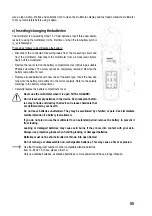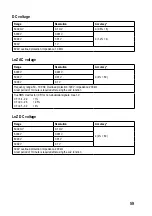
46
Follow the steps below to measure DC (V ) voltages:
• Turn the DMM on and select “V ” mode. Press the “MODE” button to switch
to DC mode. “DC” will appear on the display.
• Plug the red lead into the V terminal (K) and the black lead into the COM
terminal (I).
• Connect both of the test prods to the measured object (battery, circuit etc.)
in parallel. Connect the red measuring probe to the positive terminal and the
black measuring probe to the negative terminal.
• The measured value is displayed together with the polarity.
If “-” appears in front of a direct voltage measurement, this indicates
that the measured voltage is negative (or that the measuring probes
have been connected in reverse).
The “V DC/AC” voltage range has an input resistance of >10 MOhm.
• After measuring, remove the test leads from the measured object and turn the
multimeter off.
d) Measuring LoZ voltages (“V”)
LoZ measurement mode may only be used up to a maximum voltage of 300 V. Due to the reduced
impedance, this measuring function is not designed for continuous measurements. Keep the meas-
urement time as short as possible.
Do not take measurements for longer than 30 seconds, and allow the multimeter to regenerate for
at least 1 minute before taking the next measurement.
LoZ mode allows you to measure AC voltages with a low impedance (approx.
200 kΩ). In this mode, the multimeter lowers the internal resistance to prevent
‘phantom’ voltage readings. As a result, the circuit is more heavily loaded than in
the standard measuring mode.
Follow the steps below to measure AC (V ) voltages:
• Turn the multimeter on and select “LoZ V
” mode. “LoZ” will appear on the
display.
• Plug the red lead into the V terminal (K) and the black lead into the COM
terminal (I).
• Connect both of the test leads to the measured object (e.g. generator or mains
voltage) in parallel.
The “LoZ” voltage range has an input resistance of <200 kOhm.
• After measuring, remove the test leads from the measured object and turn the
multimeter off.
















































